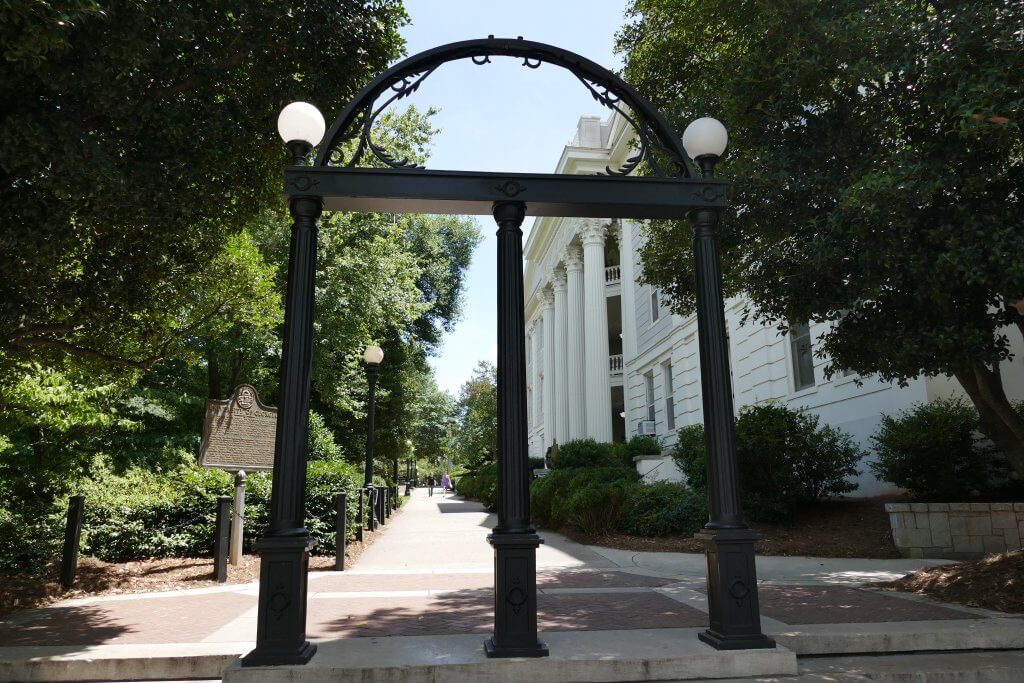
With the need for making amends for racial injustices old and new getting a public reckoning, a group responsible for reviewing the origin of names of Georgia’s college buildings are preparing to recommend changes early next year.
A group of historians led by Civil War author Lisa Tendrich Frank is going through a list of names of buildings and colleges around the state to find out more about their namesakes. The researchers are poring over old books, alumni magazines and obituaries to get a sense of the people honored with the buildings’ names.
“A lot of the buildings are named after Georgia politicians or prominent families, those are very easy to get information on,” Frank said at a call-in meeting of the University System of Georgia’s Naming Advisory Group Wednesday. “When they named it after a professor – I’ve been doing a lot of the Georgia Tech ones today – some of the ones named after math professors or chemistry professors, that requires more digging.”
When they are done, the historians will present their findings to the advisory group, which includes Albany State University President Marion Fredrick, Chick-fil-A executive Michael Patrick, retired Georgia Court of Appeals Judge Herbert Phipps, University of Georgia Foundation Vice Chairman Neal Quirk and Sally Wallace, dean of the Andrew Young School of Policy Studies at Georgia State University.
The group plans to look at the information provided by the historians and make recommendations about whether name changes are warranted. It started with a list of 3,000 buildings across the state and is quickly whittling the list down.
The board began its work in July as hundreds of thousands of people took to the streets in protests over the violent deaths of Black citizens. Americans are increasingly questioning the morality of displaying monuments to Confederate officers or to politicians who supported segregation and other racist policies.
UGA’s Grady early focus
The University of Georgia’s Grady College of Journalism and Mass Communication is drawing a groundswell of pressure to change its name so it no longer honors a segregationist.
A petition started by a Grady alum to rename the school after Charlayne Hunter-Gault, the first Black woman to attend UGA, has received more than 9,000 signatures. Hunter-Gault is a Grady graduate and an award-winning journalist.
The school’s current namesake, Henry Grady, was also a celebrated journalist. He is credited with coining the phrase “New South” and helping to move Georgia’s post-Reconstruction economy away from agrarianism and toward industrialism, bringing about major economic growth. Other institutions have also been named after Grady, including Henry Grady High School and Grady Hospital, both in Atlanta, where a statue of the man stands on Marietta Street.
But Grady also professed white supremacist beliefs, declaring in 1888 that “the supremacy of the white race of the South must be maintained forever, and the domination of the negro race resisted at all points and at all hazards, because the white race is the superior race.”
Kimberly Davis of Athens is one of the petition’s signers. She earned her masters degree from Grady in 2008, but it was not until she had already graduated that she learned about Grady’s racist beliefs.
“I was not surprised, but I was shocked that I had not heard these things before,” she said. “I also was really cognizant of the fact that there are a lot of buildings on the University of Georgia’s campus, not just buildings, but names, that would make it a place that is not welcoming, particularly to Black people like me. And I couldn’t imagine walking onto that campus every day and seeing all of the names that represent slaveholders, white supremacy, et cetera.”
One group of alumni created a list of 18 buildings they say were named after slave owners or segregationists.
Changing those names would make the university a lot more welcoming, Davis said. The university is planning a celebration of the 60th anniversary of its integration next February. That would be a great occasion to rename the Grady School to the Charlayne Hunter-Gault School, Davis said.
“I think it would mean a lot, not just to the students, but also to the workers on campus who are there every day, year after year, and also to this community. I live in Athens, I’m a fourth generation, native Athenian, my parents met at the University of Georgia. If it wasn’t for Charlayne Hunter-Gault, integrating, I wouldn’t be here.”
Last February the university renamed its College of Education after Mary Frances Early, another UGA Black pioneer.
“Names are important, spaces are important,” Davis said. “And when you integrate those spaces, people feel a greater connection to those spaces, and I think the University of Georgia would greatly benefit from that for generations to come.”
A product of his time
Other Grady grads feel differently.
Henry Grady’s words and beliefs are indefensible, said Brian Robinson, former deputy chief of staff to Gov. Nathan Deal and owner of an Atlanta communications firm, but they should not necessarily be grounds for a name change.
“The legacy of slavery and segregation and human rights abuses are part of our history, but we shouldn’t fall into the trap that that is the only prism through which we should view our history,” he said. “In the 1880s, you would be hard-pressed, if you could get in a time machine and go back and speak with the leaders of the state or regular white citizens of the state, it would be hard to find people who didn’t hold racist views. They were part of the culture.”
Robinson has told members of the committee consideration should be given to why the building was named after the person.
“We should judge the people we have honored on the standard of ‘why do we honor them,’” he said. “Do we honor them because they were segregationists, because they were staunch defenders of slavery? Because they were outspokenly racist? Is that their claim to fame? That they were the most extreme in defense of Jim Crow and white supremacy? I think if that is why we honored them, then those are the people whose historical honors should be taken away, and I think we’re already beginning that process.”
Robinson said he would love to see something on campus named after Hunter-Gault, as well as other Georgia leaders like Martin Luther King Jr., Andrew Young and John Lewis, but the board should take a nuanced approach.
“I believe the move toward reconciliation is less about subtraction than it is about addition,” he said.
“What I would say to students is, you deserve to have, in your daily walk around campus, places, things that honor the great Georgians who look like you. That needs to be part of our tableau. So let’s find a way as we move forward to address the imbalance by consciously looking at Black Georgians, and people of other ethnicities.”
Other recent controversies
The call for change comes as UGA is facing increased criticism from Black and Hispanic students over discrimination complaints.
The Lambda Chi Alpha fraternity at UGA voluntarily suspended operations in September after screenshots of misogynistic, racist and homophobic chat messages were posted online.
UGA junior Arianna Mbunwe, the target of those messages, later posted to Twitter an email from the school’s Equal Opportunity Office responding to her complaint by asking her to answer for her own tweets criticizing all-white sororities and UGA President Jere Morehead.
Such incidents are not rare, according to UGA Black Student Union Chairman Joshua Patton.
“While our country is stricken with blatant racial injustice, police brutality, economic disparity and other forms of oppression, we would like to think that our university would be a place where all students can be accepted, but we have continuously been shown that this will not be the case anytime soon,” Patton wrote in a statement following the incident.
Former Bulldogs football player Otis Reese, who transferred to Ole Miss in January, said in a statement last month that his year and a half at UGA “took a devastating mental toll” because of racial abuse.
Reese described aggressive confrontations with police officers and racial slurs and other abuse from white student-athletes.
“I didn’t want to be part of a campus where my classmates held that kind of hate in their hearts,” Reese wrote. “None of these things were ever addressed by the coaches at UGA. There was literally nobody to speak to about these types of things without having fear of losing your position on the team.”
UGA has long been committed to fostering diversity and inclusion and has announced programs in recent months to further those goals, university spokesman Greg Trevor said.
These include a Presidential Task Force on Race, Ethnicity and Community launched by Morehead in August with the goal of improving campus culture. Morehead also charged a separate committee to develop a comprehensive plan to build on its most recent diversity plan.
The university also offers grants to help underrepresented groups start and succeed in college and year-round workshops, as well as tutoring and mentoring through the USG’s African American Male Initiative, and over the summer, UGA created 528 endowed, need-based scholarships through its Georgia Commitment Scholarship program.
“This strong foundation coupled with a commitment to building on past successes has earned UGA the INSIGHT Into Diversity Higher Education Excellence in Diversity Award,” Trevor said. “The HEED Award is the only national recognition honoring colleges and universities that exhibit outstanding efforts and success in the area of diversity and inclusion, and 2020 marks the seventh consecutive year UGA has received it.”
This article appears in partnership with Georgia Recorder







